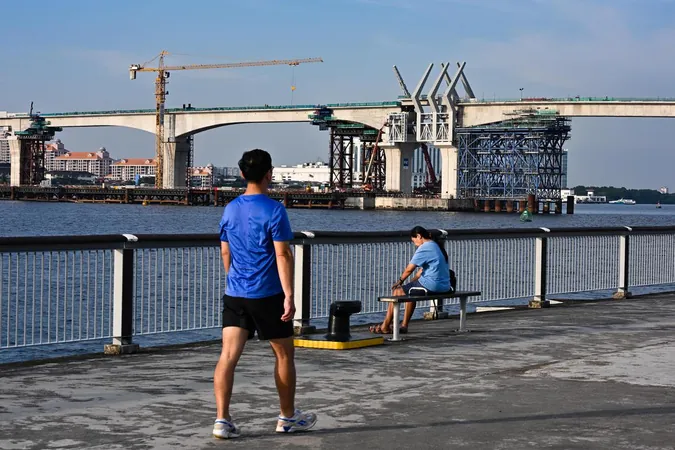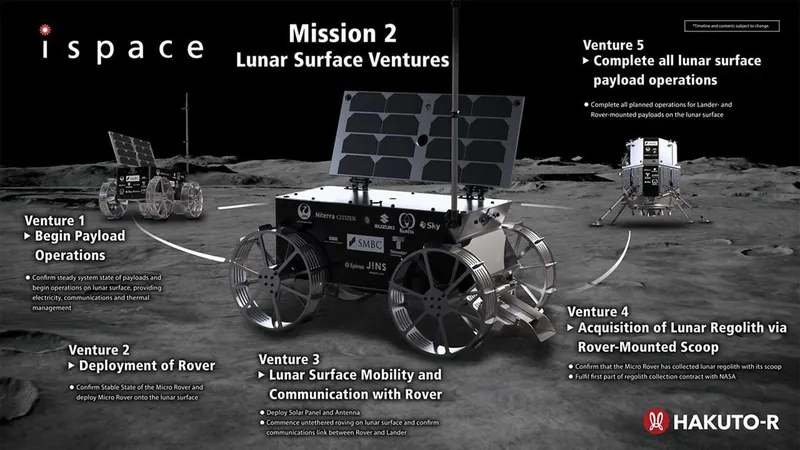
Thriving Together: Singapore and Malaysia Set the Stage for a Renewable Energy Revolution!
2025-01-07
Author: Mei
Significant Leap Towards Sustainable Development
In a significant leap towards sustainable development, Singapore and Malaysia are eager to ramp up their collaboration in cutting-edge sectors such as electricity trading and renewable energy initiatives. This strategic move follows ongoing infrastructure projects that already strengthen ties between the two nations, namely the Johor-Singapore Special Economic Zone (JS-SEZ) designed for businesses and investments, along with the highly anticipated Johor Bahru-Singapore Rapid Transit System (RTS) Link, which is expected to commence operations by the end of 2026.
Ambitious Electricity Import Plans
During a press briefing on January 7, following the 11th Malaysia-Singapore Leaders’ Retreat in Putrajaya, Prime Minister Lawrence Wong of Singapore revealed ambitious plans for importing electricity from Sarawak through undersea cables. This project is set to capitalize on the successful momentum generated by the Lao PDR-Thailand-Malaysia-Singapore Power Integration Project, which saw its inaugural electricity flow from Malaysia to Singapore begin in September 2024, with nearly 8,000 megawatt-hours (MWh) having been traded under its second phase.
Memorandums of Understanding Signed
At the Leaders' Retreat, which served as a pivotal platform for both leaders to outline the future of bilateral relations, six memorandums of understanding and a letter of intent were signed. These agreements focused on promising areas such as carbon capture and storage, and the trading of carbon credits, marking a significant commitment towards addressing climate change challenges.
RTS Link Project Progress
The RTS Link project is progressing efficiently, with PM Wong confirming that it will have the capacity to transport up to 10,000 passengers per hour in both directions between Bukit Chagar and Woodlands North. This is expected to significantly alleviate congestion at the Causeway — a crucial thoroughfare between Singapore and Malaysia.
Addressing Business Concerns
Concerns regarding the RTS Link’s potential effects on Singaporean businesses were also addressed. While there is apprehension that this new transportation option could shift shopping patterns, encouraging more Singaporeans to frequent Johor, PM Wong reminded stakeholders that the retail landscape is continually evolving. Competition is not only local but also online, compelling businesses to adapt swiftly to the ever-changing environment.
The Importance of Adaptation
“In this dynamic landscape, it’s premature to conclude the RTS Link’s net impact on business,” he stated. “While it may draw more Singaporeans to shop in Johor, it could equally invigorate the influx of Malaysian shoppers into Singapore, particularly with many businesses in the northern regions already catering to this cross-border traffic.”
Recognizing the fundamental shifts in consumer behavior, the government remains dedicated to supporting local businesses. PM Wong emphasized the importance of innovation in business models and encouraged companies to explore online opportunities to expand their reach and engage new customers.
“Adaptation is key,” he declared. “Given the persistent emergence of new models, competition, and disruptions, businesses must continuously evolve to meet new demands.”
A Greener Future Together
As both nations strive for a greener and more interconnected future, the groundwork laid in these recent initiatives promises exciting prospects for economic growth and sustainability in the region.



 Brasil (PT)
Brasil (PT)
 Canada (EN)
Canada (EN)
 Chile (ES)
Chile (ES)
 España (ES)
España (ES)
 France (FR)
France (FR)
 Hong Kong (EN)
Hong Kong (EN)
 Italia (IT)
Italia (IT)
 日本 (JA)
日本 (JA)
 Magyarország (HU)
Magyarország (HU)
 Norge (NO)
Norge (NO)
 Polska (PL)
Polska (PL)
 Schweiz (DE)
Schweiz (DE)
 Singapore (EN)
Singapore (EN)
 Sverige (SV)
Sverige (SV)
 Suomi (FI)
Suomi (FI)
 Türkiye (TR)
Türkiye (TR)